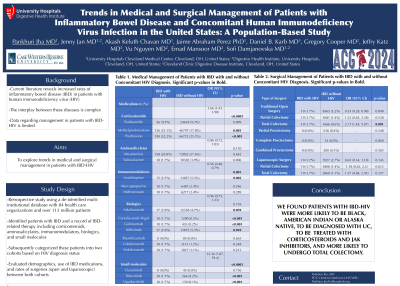Tuesday Poster Session
Category: IBD
P4404 - Trends in Medical and Surgical Management of Patients With Inflammatory Bowel Disease and Concomitant Human Immunodeficiency Virus Infection in the United States: A Population-Based Study
Tuesday, October 29, 2024
10:30 AM - 4:00 PM ET
Location: Exhibit Hall E

Has Audio

Pankhuri Jha, MD
University Hospitals Cleveland Medical Center
Cleveland, OH
Presenting Author(s)
Pankhuri Jha, MD1, Jenny Jan, MD1, Akash Keluth Chavan, MD2, Jaime A. Perez, PhD3, Daniel Karb, MD4, Jeffry Katz, MD5, Vu Q. Nguyen, MD, MS5, Emad Mansoor, MD5, Sofi Damjanovska, MD2, Gregory Cooper, MD6
1University Hospitals Cleveland Medical Center, Cleveland, OH; 2University Hospitals Cleveland Medical Center, Case Western Reserve University, Cleveland, OH; 3University Hospitals Clinical Research Center, Cleveland, OH; 4Cleveland Clinic, Cleveland Heights, OH; 5Digestive Health Institute, University Hospitals Cleveland Medical Center, Cleveland, OH; 6Case Western Reserve University, Cleveland, OH
Introduction: Current literature reveals increased rates of inflammatory bowel disease (IBD) in patients with human immunodeficiency virus (HIV), but the intersection between these diseases is complex. Data regarding management in patients with IBD and concomitant HIV (IBD-HIV) is limited. The aim of our study was to explore trends in medical and surgical management in these patients.
Methods: We used a national de-identified health research network sourced from 84 health care organizations within the United States (TriNetX, Cambridge, MA). Data was accessed until February 05, 2024. We identified patients with a diagnosis of IBD and categorized them into two cohorts: those with a diagnosis of HIV and those without. We compared demographics, use of IBD medications, and rates of surgeries between cohorts.
Results: We identified 264,194 patients with IBD, of which 590 (0.2%) had IBD-HIV. More IBD-HIV patients were Black (199 [33.7%] vs 20,918 [7.9%]; p< 0.0001), American Indian or Alaska Native (10 [1.7%] vs 645 [0.2%]; p< 0.0001). Patients with IBD-HIV were more frequently diagnosed with ulcerative colitis (UC; 392 [66.4%] vs 130,937 [49.7%]; p< 0.0001). The use of prednisone and methylprednisolone was higher in IBD-HIV patients (32.2% vs 25.3%, p< 0.001; 23.1% vs 17.8%, p< 0.001; respectively). There was no difference in the use of biologics between both groups (OR=0.96, 95% CI [0.75-1.23]; p=0.759). Adalimumab (2.9% vs 4.7%, p=0.039) and infliximab (2.9% vs 5.3%, p=0.010) were used less in IBD-HIV patients. Small molecules were used more in IBD-HIV patients (OR=12.36, 95% CI [7.87-19.42]; p< 0.0001). Tofacitinib (1.7% vs 0.2%, p< 0.001) and Upadacitinib (1.7% vs 0.1%, p< 0.001) were used more in IBD-HIV patients. IBD-HIV patients were more likely to undergo total colectomy (OR=2.71, 95% CI [1.45-5.07]; p=0.001).
Discussion: To date, this is the largest retrospective cohort study evaluating trends in medical and surgical management in IBD-HIV patients. We found an increased prevalence of UC in IBD-HIV patients and elevated rates of concomitant HIV in racial/ethnic minorities, which can guide future management strategies. IBD-HIV patients are more likely to be treated with corticosteroids and Janus kinase (JAK) inhibitors, but the reason for this difference in prescribing patterns is unclear. However, these patients were more likely to undergo total colectomy, suggesting either failed medical management or more severe phenotype. More studies are needed to identify optimal management of these patients.
Disclosures:
Pankhuri Jha, MD1, Jenny Jan, MD1, Akash Keluth Chavan, MD2, Jaime A. Perez, PhD3, Daniel Karb, MD4, Jeffry Katz, MD5, Vu Q. Nguyen, MD, MS5, Emad Mansoor, MD5, Sofi Damjanovska, MD2, Gregory Cooper, MD6. P4404 - Trends in Medical and Surgical Management of Patients With Inflammatory Bowel Disease and Concomitant Human Immunodeficiency Virus Infection in the United States: A Population-Based Study, ACG 2024 Annual Scientific Meeting Abstracts. Philadelphia, PA: American College of Gastroenterology.
1University Hospitals Cleveland Medical Center, Cleveland, OH; 2University Hospitals Cleveland Medical Center, Case Western Reserve University, Cleveland, OH; 3University Hospitals Clinical Research Center, Cleveland, OH; 4Cleveland Clinic, Cleveland Heights, OH; 5Digestive Health Institute, University Hospitals Cleveland Medical Center, Cleveland, OH; 6Case Western Reserve University, Cleveland, OH
Introduction: Current literature reveals increased rates of inflammatory bowel disease (IBD) in patients with human immunodeficiency virus (HIV), but the intersection between these diseases is complex. Data regarding management in patients with IBD and concomitant HIV (IBD-HIV) is limited. The aim of our study was to explore trends in medical and surgical management in these patients.
Methods: We used a national de-identified health research network sourced from 84 health care organizations within the United States (TriNetX, Cambridge, MA). Data was accessed until February 05, 2024. We identified patients with a diagnosis of IBD and categorized them into two cohorts: those with a diagnosis of HIV and those without. We compared demographics, use of IBD medications, and rates of surgeries between cohorts.
Results: We identified 264,194 patients with IBD, of which 590 (0.2%) had IBD-HIV. More IBD-HIV patients were Black (199 [33.7%] vs 20,918 [7.9%]; p< 0.0001), American Indian or Alaska Native (10 [1.7%] vs 645 [0.2%]; p< 0.0001). Patients with IBD-HIV were more frequently diagnosed with ulcerative colitis (UC; 392 [66.4%] vs 130,937 [49.7%]; p< 0.0001). The use of prednisone and methylprednisolone was higher in IBD-HIV patients (32.2% vs 25.3%, p< 0.001; 23.1% vs 17.8%, p< 0.001; respectively). There was no difference in the use of biologics between both groups (OR=0.96, 95% CI [0.75-1.23]; p=0.759). Adalimumab (2.9% vs 4.7%, p=0.039) and infliximab (2.9% vs 5.3%, p=0.010) were used less in IBD-HIV patients. Small molecules were used more in IBD-HIV patients (OR=12.36, 95% CI [7.87-19.42]; p< 0.0001). Tofacitinib (1.7% vs 0.2%, p< 0.001) and Upadacitinib (1.7% vs 0.1%, p< 0.001) were used more in IBD-HIV patients. IBD-HIV patients were more likely to undergo total colectomy (OR=2.71, 95% CI [1.45-5.07]; p=0.001).
Discussion: To date, this is the largest retrospective cohort study evaluating trends in medical and surgical management in IBD-HIV patients. We found an increased prevalence of UC in IBD-HIV patients and elevated rates of concomitant HIV in racial/ethnic minorities, which can guide future management strategies. IBD-HIV patients are more likely to be treated with corticosteroids and Janus kinase (JAK) inhibitors, but the reason for this difference in prescribing patterns is unclear. However, these patients were more likely to undergo total colectomy, suggesting either failed medical management or more severe phenotype. More studies are needed to identify optimal management of these patients.
Disclosures:
Pankhuri Jha indicated no relevant financial relationships.
Jenny Jan indicated no relevant financial relationships.
Akash Keluth Chavan indicated no relevant financial relationships.
Jaime Perez indicated no relevant financial relationships.
Daniel Karb indicated no relevant financial relationships.
Jeffry Katz indicated no relevant financial relationships.
Vu Nguyen: AbbVie – Speakers Bureau. Eli Lilly – Speakers Bureau.
Emad Mansoor: Lilly – Speakers Bureau. Takeda – Speakers Bureau.
Sofi Damjanovska indicated no relevant financial relationships.
Gregory Cooper: Exact Sciences – Advisory Committee/Board Member, Grant/Research Support.
Pankhuri Jha, MD1, Jenny Jan, MD1, Akash Keluth Chavan, MD2, Jaime A. Perez, PhD3, Daniel Karb, MD4, Jeffry Katz, MD5, Vu Q. Nguyen, MD, MS5, Emad Mansoor, MD5, Sofi Damjanovska, MD2, Gregory Cooper, MD6. P4404 - Trends in Medical and Surgical Management of Patients With Inflammatory Bowel Disease and Concomitant Human Immunodeficiency Virus Infection in the United States: A Population-Based Study, ACG 2024 Annual Scientific Meeting Abstracts. Philadelphia, PA: American College of Gastroenterology.

